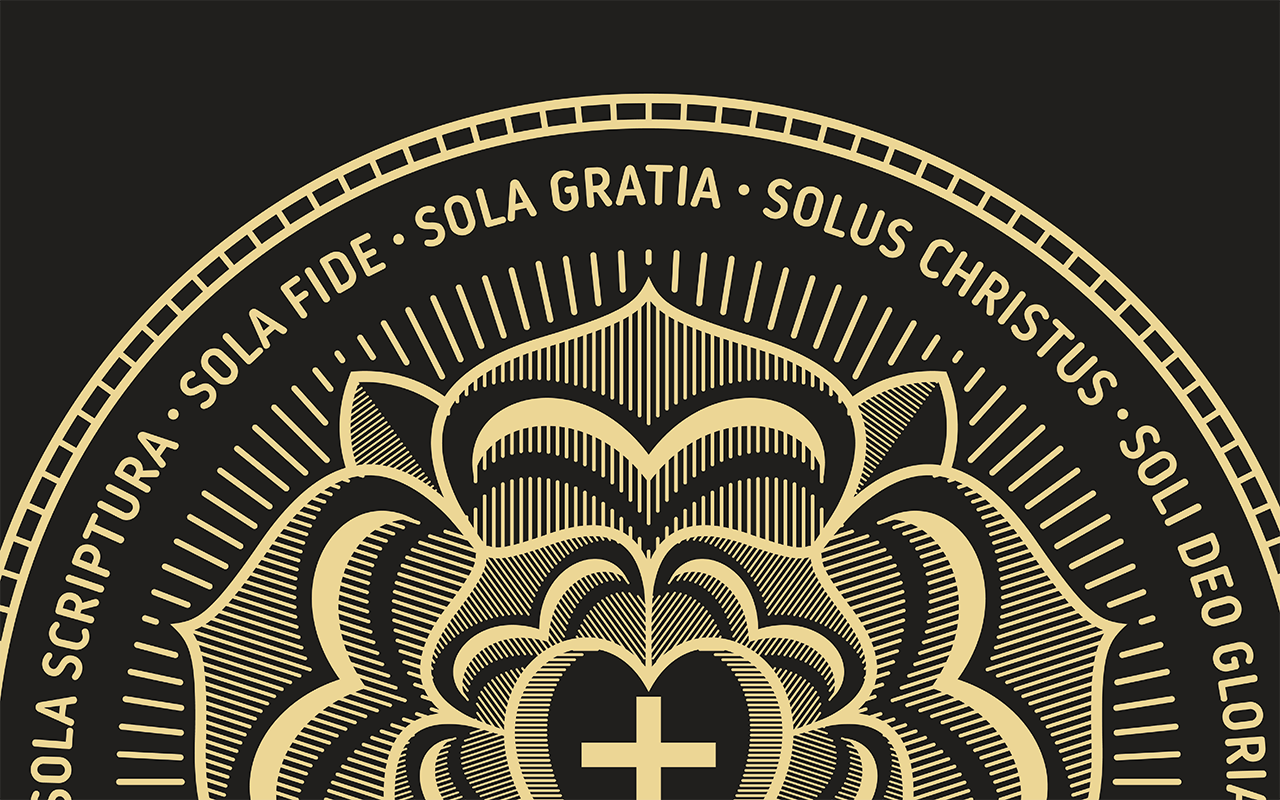In 2005 Bishop Desmond Tutu, the Anglican theologian and Nobel Laureate known for his anti-apartheid work in South Africa, wrote a beautiful book titled God Has a Dream: A Vision of Hope for Our Time. In the introduction, Tutu writes, “We all lose hope that the suffering in our lives and in the world will ever end. I want to share with you my faith and my understanding that this suffering can be transformed and redeemed. … Indeed, God is transforming the world now—through us—because God loves us.”
Tutu gives testimony to the truth that the Christian faith can provide hope even in the face of the horrors of apartheid in South Africa because it is based in the glorious, gracious love of God.
Most Protestant Christians are familiar with the Five Solas—Sola Scriptura, Sola Fide, Sola Gratia, Solus Christus, and Soli Deo Gloria. These categories were not systematically expounded in their five-part form until centuries after the Protestant Reformation, though the themes and sometimes even the language itself can be found in the writings and teachings of any number of early Protestant Reformers. Also well known to Christians are the three theological virtues—faith, hope, and love, drawn from 1 Corinthians 13:13 and alluded to by Tutu above.
In this article, I suggest that the Protestants’ Five Solas can remind us that the Christian faith begins with the love of God made known to us in Jesus Christ. With the grace of the Holy Spirit empowering us, we respond with hopeful love to the glory of God. That is, at the core of the Five Solas and at the core of Reformed theology is the love of God shown to us in the grace of Christ.
Pairing the Five Solas with the three theological virtues can provide us comfort and assurance while inviting us to live as reflections of God’s love and glory. Because the basis of our salvation is God’s love for us, we are freed to live a life of love dedicated to the glory of God. We are empowered to live confidently and joyfully according to the kingdom of God. A life of faith gifted by the Holy Spirit, confidently hoping in the grace of Jesus, and enlivened by the love of the Father should cast for us and the world a compelling vision of Reformed theology.
Solus Christus and Sola Scriptura
Jesus Christ is the center of the biblical narrative. John Calvin, drawing from many theologians before him, emphasizes this point. In Preface to Pierre Robert Olivétan’s French Bible, he writes, “Scripture is also called gospel, that is, new and joyful news, because in it is declared that Christ, the sole true and eternal Son of the living God, was made man, to make us children of God his Father, by adoption.” The Bible makes known to us the Word made flesh, Jesus Christ. As The Jesus Storybook Bible beautifully emphasizes, the story of the Bible is a love story because “every story whispers” the name of Jesus and, thus, the love of our Triune God for the whole of his creation.
Reformed Christians confess this story told in the Bible is the primary way that the saving work of God in Jesus is made known to us. God certainly reveals himself through other means—creation and the sacraments, for example. But God’s primary revelation to us is in the person of Jesus Christ, and Jesus is made known to us through the Bible. As the Belgic Confession articulates, God is “known to us more clearly by his holy and divine Word.” At the heart of that revelation is “God’s glory” and “our salvation” (Belgic Confession, Art. 2). The Bible ties the glory of God and our salvation to Jesus Christ (John 1:14, John 17:3-4, and Rom. 5:1-2). What Scripture reveals to us above all else is Christ alone, in whom we see the fullness of God’s glory and our salvation.
God’s revelation to us in Jesus, the Word made flesh who is testified to in the Bible, shows us God’s love. Calvin makes the connection between Christ, Scripture, and love in his Genevan Catechism. In the context of discussing trust in God, Calvin asks how the love of God will be made apparent to us. The Catechism answers, “In his Word, where he reveals his mercy to us in Christ, and testifies of his love towards us” (Calvin, Concerning the Faith). Calvin points us to the Bible, which points us to Christ, which points us, ultimately, to God’s love for us. In other words, the virtue of love flows from God to us through God’s self-revelation in Jesus and the Bible. God revealing himself to us is an act of love because it flows from who God is. God is love. In revealing himself to us in Jesus and the Bible, God invites us in as participants in his divine love. We love because God first loved us, a love that comes to us in Jesus as he is made known in the Bible.
Sola Gratia and Sola Fide
That God reveals himself and his love in Jesus and through the Spirit’s work in Scripture is sheer grace. In creation, we come to know the God who graciously creates all that is good and beautiful. This knowledge should persuade us, Calvin says, “that God is the fountain of all goodness, and that we must seek everything in him, and in none but him.” In this way, our knowledge of God the Creator is the result of God’s grace to his creation.
Because of the original sin that Adam and Eve unleashed in their disobedience, humanity is no longer able to clearly and fully see the grace of God in creation. God’s grace continues, however, as God reveals his plan of redemption through the Bible. That story, focused on Jesus, is one of grace from beginning to end. The Canons of Dordt speak beautifully about the grace of God’s work in Christ “to demonstrate his mercy, to the praise of the riches of God’s glorious grace” (Canons of Dordt, First Main Point of Doctrine, Art. 7). The Canons go on to make clear that salvation is never earned. Instead, our salvation comes to us “without any merit of my own, out of sheer grace” (Heidelberg Catechism, Q&A 60). The story of Jesus Christ made known in Scripture is one of complete gift.
Reformed Christians, echoing Romans 3:27, are clear that we have access to that grace through faith. We are justified by faith alone. Still, faith is not what justifies us. The Belgic Confession emphasizes this: “We do not mean that faith itself justifies us, for it is only an instrument with which we embrace Christ our Righteousness” (Belgic Confession, Art. 22). Faith is the instrument by which we have communion with Christ. Through faith all of Christ’s benefits and merits become ours. Faith is a gift, complete grace, the Holy Spirit kindles in us that embraces Jesus Christ (Heidelberg Catechism, Q&A 21; Canons of Dordt, Second Main Point of Doctrine, Art. 7). Faith is not something we produce. It is not another work. To connect to the previous three “Solas,” faith is the result of grace, which comes to us in and through the work of Jesus Christ and made known to us in the Bible.
Faith gives comfort because it is more than intellectual knowledge. As the Heidelberg Catechism famously says in Q&A 21, faith is “a whole-hearted trust.” Even the most faith-filled hearts might find it difficult to trust whole-heartedly. But, because these are gifts God gives to us, our own weaknesses and doubts are not reason to despair. Instead, they are invitations to turn again to the sure foundation of our faith—the grace of God shown to us in Jesus.
The assurance found in the Reformed tradition’s emphasis that God’s gracious salvation made ours through faith connects to the theological virtue of hope. If faith were up to us to achieve, we would all be literally hopeless. Because our faith is a result of the grace of Jesus, faith is a hope-filled posture. The work of salvation has already been accomplished. Our hope truly is built on nothing less than Jesus, and his love is a firm foundation. Solus Gratia and Sola Fide are statements of hope because they base salvation not in ourselves but in God.
This means for Reformed Christians that the life of faith is one of hope and freedom. We are free. We are free from needing to muster up enough faith for the next day. We are free from needing to somehow earn God’s grace. We are free from sin that condemns and from the evil that overwhelms and from death’s inescapable verdict. But Reformed theology is adamant we are not just free from; we are also free for. We are freed for a life that walks more and more in step with the Spirit. We are freed for communities that demand justice and to give generously and serve humbly. We are freed for life with God, a life focused on the glory and love of God, precisely because of the grace that Christ has shown us and is ours through the Spirit producing faith in us.
Soli Deo Gloria
This vision of the loving grace of God shown to us in Jesus Christ, revealed in Scripture, and made ours through faith, motivated those early Protestants in the 1500s to seek the glory of God. Consider the lesser-known reformer Johannes à Lasco. Drawn in by the grace of Christ he read in Scripture, Lasco turned away from a posh career in the Catholic Church. Instead, he worked as a leader in Protestant churches throughout Europe. His faith led him to work for the glory of God but required great hope, especially when persecution forced him to flee first to London, then to Germany, and finally to Poland. Lasco’s hope was rooted in the gracious love of God and led him to a life of love dedicated to serving his congregations. Reformed churches around the world today continue to testify to the love and glory of God, in part because of Lasco’s faith, hope, and love.
The Reformed tradition emphasizes that salvation is both for the assurance of Christians and for the glory of God’s name (Canons of Dordt, 5th Main Point of Doctrine, Art. 15). The concept of Soli Deo Gloria—to God alone be the glory—means that God alone is the one who is worthy of all glory for all things, including the work of salvation. The phrase also is used in the Reformed tradition to note that in all things Christians are to glorify God. These two ways of thinking about Soli Deo Gloria are not opposed. Because God’s glory is at the core of our salvation, we are freed to pursue God’s glory in the whole of our lives.
We see that God’s love for us is rooted in his own glory. We are invited to find our true humanity and purpose in glorifying God. This also connects to love. We reflect the glory of God’s salvation through loving God and loving others. In other words, we see God’s glory, and his alone, in his love that enacts our salvation. In being filled with God’s Spirit, our redeemed lives bring God glory when we love God and others.
Reformed Theology and the ‘Greatest of These’
What is at the “core” of Reformed theology is often debated—predestination, Scripture, God’s sovereignty, something else? What the Five Solas can show us is that what underlies all Reformed theology is actually God’s love. It is God’s love that reveals God’s glory to us, most clearly in Jesus and in Scripture. It is God’s love from which his grace flows, working faith in us and salvation for us. And it is because of God’s love that God invites us to experience his glory now and for all eternity.
Consider in recent decades the way in which the love of God can move faith-filled women in the CRCNA and beyond to tell their stories as victims of abuse with remarkable hope for justice and healing. Their faith hopes against all earthly hope that the love of God can reach into and redeem the darkest places of victims’ lives, families, churches, and communities. Those specific stories are not mine to tell here. But, they are stories where the grace of Jesus can work faith and hope in women (and men) even when the powers of evil have done their worst to these saints. In their work, we see testimonies of the Word of God working in divine ways so that God’s love and glory can fill them and us with love for others, especially those who are most vulnerable, ignored, or disregarded.
The beautiful, lifelong task of Reformed theology is exploring how the love of God will stretch to every corner of our faith and of our lives. How will God’s loving revelation in his Word transform how we conduct our businesses? How will God’s loving grace that extends forgiveness to us impact our willingness to forgive others? How will God’s glory that he invites us into lead us to care for God’s creation or produce glorious music or use our bodies in sports? Reformed theology is always a theology lived before the face of God, coram Deo. We who have seen Jesus’ face have seen the glory of God (John 1:14). His glory is that of love, a love he invites us into (John 15:9). Christ alone and Scripture alone, grace alone and faith alone, and to the glory of God alone—all of it produces in us faith and hope. Faith and hope and these Five Solas all point us to the greatest thing, God’s saving love for us and his invitation to join in the Triune love of Father, Son, and Holy Spirit.
About the Author
Rev. Kyle Dieleman is associate professor of theology and history at Dordt University. He's the author of The Battle for the Sabbath in the Dutch Reformation: Devotion or Desecration? Kyle and his wife and three children are members of Covenant CRC in Sioux Center, Iowa.









